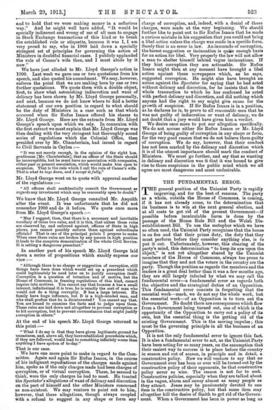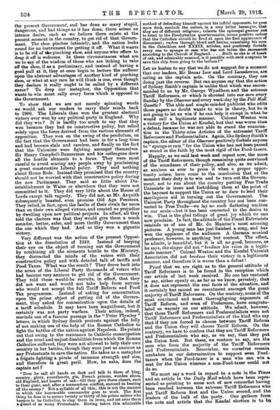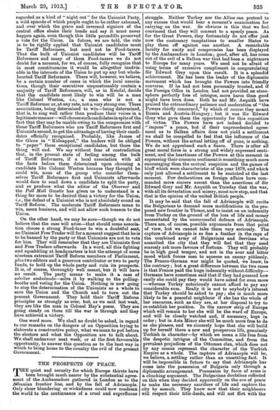THE FUNDAMENTAL ERROR. T HE general position of the Unionist Party
is rapidly improving, and for the best of reasons. The party as a whole, outside the House of Commons, is coming, if it has not already come, to the determination that its business is to win at the next general election, and at all costs to get rid of the present Government—if possible before incalculable harm is done by the passage of the Home Rule Bill and the Welsh Dis- establishment Bill. To use the metaphor which we have so often used, the Unionist Party recognizes that the house is on fire and that their prime duty, the duty that they must perform before they consider anything else, is to put it out. Unfortunately, however, this clearing of the party's mind, this determination "to keep its eye upon the object," is not yet altogether shared by the Unionist members of the House of Commons, always too prone to imagine that they and not the voters in the country are the party. Though the position as regards the members and the leaders is a great deal better than it was a few months ago, they are still largely infected by what we may call the fundamental error—a fundamental error as regards both the objective and the strategical duties of an Opposition. This fundamental error consists in forgetting that the essential work—mark, we do not say the whole work, but the essential work—of an Opposition is to turn out the Government. No doubt there are consequences which flow from a Government being turned out, one of which is the opportunity of the Opposition to carry out a policy of its own, but the essential thing is the getting rid of the existing Government. This is the moving impulse ; this must be the governing principle in all the business of an Opposition.
It is not the only fundamental error to ignore this fact. It is also a fundamental error to act, as the Unionist Party have been acting for so many years, on the assumption that their easiest way to success is to place before the country in season and out of season, in principle and in detail, a constructive policy. Now we will venture to say that no Government ever has been or ever will be turned out by the constructive policy of their opponents, be that constructive policy never so wise. The reason is not far to seek. Constructive policies, especially when they are talked about in the vague, alarm and annoy almost as many people as they attract. Jones may be passionately devoted to one item in the constructive policy, but that same item may altogether kill the desire of Smith to get rid of the Govern- ment. When a Government has been in power as long as the present Government, and has done as many stupid, dangerous, and bad things as it has done, there arises an intense desire, such as we believe there exists at the present moment in the country, to get rid of that Govern- ment. The shoe pinches intensely, and the nation looks round for an instrument for getting it off. What it wants is to be rid of the pinching shoe, and anyone who offers to drag it off is welcome. In these circumstances what are we to say of the -wisdom of those who are itching to take off the shoe, if as a preliminary, and instead of having a good pull at it, they at once begin to lecture the sufferer upon the abstract advantages of another kind of pinching shoe, or what at any rate he will think is one, even though they declare it really ought to be called by a different name ? To drop our metaphor, the Opposition that wants to win must rally every force which is opposed to the Government.
To show that we are not merely spinning words we would ask our readers to carry their minds back to 1906. The Liberals then won the greatest electoral victory ever won by any political party in England. Why did they win ? It is hardly too much to say that they won because they had no constructive policy, but relied solely upon the force derived from the various elements of opposition. They won on the swing of the pendulum, on the fact that the Government had been in for a long time and had become stale and careless, and finally on the fact that the Unionists were fighting amongst themselves. Sir Henry Campbell-Bannerman and his colleagues drew all the hostile elements to a focus. They were most careful to avoid scaring any people away by proclaiming a. great constructive Liberal policy. They said nothing about Home Rule. Instead they promised that the country should not be worried with that constructive policy during the new Parliament. They said so little about Dis- establishment in Wales or elsewhere that they were not committed to it. They did very little about the House of Lords except talk vaguely. They did not, as Mr. Asquith subsequently boasted, even promise Old Age Pensions. They relied, in fact, upon the faults of their rivals far more than on their own alleged virtues, and created no prejudice by dwelling upon new political projects. in effect, all they told the electors was that they would give them a much sounder, better, safer, and more thrifty Government than the one which they had. And so they won a gigantic victory.
Very different was the action of the present Opposi- tion at the dissolution of 1910. Instead of keeping their eye on the object of turning out the Government by combining all the elements hostile to the Ministry, they distracted the minds of the voters with their constructive policy and with detailed talk of tariffs and Food Taxes. What was the result ? They drove back into the arms of the Liberal Party thousands of voters who had become very anxious to get rid of the Government. They told these would-be recruits, in effect, that they did not want and would not take help from anyone who would not accept the full Tariff Reform and Food Tax programme. Instead of asking for concentration upon the prime object of getting rid of the Govern- ment, they asked for concentration upon the details of a tariff schedule. It may have been magnificent, but it certainly was not party warfare. Their action, indeed, reminds one of a famous passage in the " Peter Plymley " letters, in which Sydney Smith protests against the folly of not making use of the help of the Roman Catholics to fight the battles of the nation against Napoleon. He points out that owing to the resistance to Catholic emancipation and the cruel and unjust disabilities from which the Roman Catholics suffered, they were not allowed to help their own country in her battles, though they were just as anxious as any Protestants to save the nation. He takes as a metaphor a frigate fighting a pirate of immense strength and size, and therefore in great peril. How, he asks, does the captain act ?
"Does he cell all hands on deck and talk to them of king, country, glory, sweethearts, gin, French prisons, wooden shoes, old England, and hearts of oak—till they give three cheers, rush to their guns, and, after a tremendous conflict, succeed in beating of the enemy ? Not a syllable of all this; this is not the manner in which the honourable commander goes to work. The first thing he does is to secure twenty or thirty of his prime sailors who happen to be Catholics, to clap them in irons, and set over them a guard of as many Protestants. Having taken this admirable method of defending himself against his infidel opponents, he gee., upon deck, reminds the sailors, in a very bitter harangue, that they are of different religions ; exhorts the episcopal gunner not to trust to the Presbyterian quartermaster, issues positive orders that the Catholics should be fired at upon the first appearance of discontent; rushes through blood and brains, examining his men in the Catechism and XXXIX. articles, and positively forbids every one to spunge or ram who has not taken the sacrament according to the Church of England. . . . Built as she is of heart of oak, and admirably manned, is it possible with such a captain to save this ship from going to the bottom?"
Let us hasten to say that we do not suggest for a moment that our leaders, Mr. Boner Law and Lord Lansdowne, are acting as the captain acts. On the contrary, they are doing just the reverse. But can anyone say that the action of Sydney Smith's captain is unlike that which was recom- mended to us by Mr. George Wyndham and the extreme Tariff Reformers, or which is shouted into our ears every Sunday by the Observe?. and every week-day by the Pall Mall Gazette? The able and single-minded publicist who edits those papers no doubt wants to win in theory, but he is not going to let us win if he can help it except in what, he would call a legitimate manner. Colonel Weston won a victory for the Union at, Kendal, but that was worse than a defeat, because he was not able to stand the examina- tion in the Thirty-nine Articles of the extremist Tariff Reformers and Preferentialists. Again, like Sydney Smith's captain, the editor of the Observer positively forbids anyone to " spuuge or ram "for the Union who has not been passed as sound in the faith by the most rigid of the Food-taxers.
Happily, as we said last week and repeat now, the mass of the Tariff Reformers, though remaining quite convinced of the soundness of their policy, and also, as we admit, as anxious as ever to press it when a proper oppor- tunity arises, have come to the conclusion that at the moment their duty is to win and to turn out the Govern- ment, not to run about the country putting Free Trade Unionists in irons and forbiddii g them at the point of the bayonet to support the Union or to dare to lend their sacrilegious aid in turning out the Government. The Unionist Party throughout the country has not been con- verted to Free Trade—we lay no such flattering unction to our souls—hut it has been converted to the desire to win. That is the glad tidings of great joy which we can now proclaim. In fact, the attitude of the Fiscal Extremists reminds us of one of Mr. du Manner's most amusing pictures. A young man has just finished a song, and has won the applause of the audience. A German musical professor, however, is anything but content. The effect, he admits, is beautiful, but it is all no good, because, as he says, the singer did not " broduce his voice in a legiti- mate manner." Colonel Weston and the Kendal Unionist Association did not broduce their victory in a legitimate manner, and therefore it is worse than a defeat !
Proof that we are right as to the general attitude of Tariff Reformers is to be found in the reception which our article of last week received. No one has ventured to say, either openly or, as far as we know, privately, that it does not represent the real facts of the situation, and it certainly has caused no resentment amongst the great majority of Tariff Reformers. On the contrary, some of the most convinced and most thoroughgoing exponents of Tariff Reform, and even of Preference, have congratu- lated us warmly on our attitude. We admit, however, that these Tariff Reformers and Preferentialists were not Tariff Reformers and Preferentialists of the kind who say that if they are forced to choose between Tariff Reform and the Union they will choose Tariff Reform. On the contrary, we have to confess that they are Tariff Reformers and Preferentialists who say, as we say, that they put the Union first. But these, we venture to say, are the men who form the majority of the Tariff Reformers and Preferentialists. Remember, we ourselves remain unshaken in our determination to support even Food-
taxers when the Food-taxer is a man who can win a seat for the Union whereas a non-Food-taxer could not
do so.
We must say a word in regard to a note in the Times and an article in the Daily Mail which have been repre- sented as pointing to some sort of new concordat having been reached between the extreme Tariff Reformers who put Tariff Reform first and the Union second, and the leaders of the bulk of the party. One gathers from
the note and article that the Kendal election is to be regarded as a kind of "night out" for the Unionist Party, a wild episode of which people ought to be rather ashamed, and over which the grave and reverend signiors of the central office shake their heads and say it must never happen again, even though this little peccadillo preserved a vote for the Union. In future, we are told, the rule is to be rigidly applied that Unionist candidates must be Tariff Reformers, but need not be Food-taxers. That the bulk of Unionist candidates will be Tariff Reformers and many of them Food-taxers we do not doubt for a moment, for we, of course, fully recognize that in most constituencies it would be altogether inadvis- able in the interests of the Union to put up any but whole- hearted Tariff Reformers. There will, however, we believe, be a certain number of cases in which the local associa- tions, though their executives unquestionably contain a majority of Tariff Reformers, will, as in Kendal, decide that the candidate most likely to win will be a man like Colonel Weston, i.e., a man who is not a Tariff Reformer or, at any rate, not a very strong one. These associations, being determined to win—being determined, that is, to sing well rather than produce their voices in a legitimate manner—will choose such candidates in spite of the fact that they may be unable owing to the compromise with those Tariff Reformers who are Tariff Reformers first and Unionists second, to get the advantage of having their candi- dates officially recognised. Probably, like James of the Glens in "Kidnapped," the leaders will be obliged to " paper " these exceptional candidates, but there the thing will end. We say without fear of contradiction that, in the present state of feeling among the bulk of Tariff Reformers, if a local association with all the facts before them determined upon choosing a candidate like Colonel Weston because they thought he could win, none of the group who consider them- selves Tariff Reformers first and Unionists afterwards would dare to send down a candidate to split the party, and so produce what the editor of the Observer and the Pall Mall Gazette has given us to understand is a thing far more to be desired than a victory for the Union, i.e., the defeat of a Unionist who is not absolutely sound on Tariff Reform. The moderate Tariff Reformers mean to win, mean business, and will not allow such treason to the Union.
On the other hand, we may be sure—though we do not believe that the case will arise—that should some associa- tion choose a strong Food-taxer to win a doubtful seat, no Unionist Free Trader will for a moment suggest that he is to be banned by the party or that Unionists are not to vote for him. They will remember that they are Unionists first and Free Traders afterwards. In a word, all this fighting and squabbling at headquarters is but the attempt of some nineteen extremist Tariff Reform members of Parliament, plus two editors and a generous contributor or two to party funds, to hold up the whole party and ruin its prospects. It is, of course, thoroughly well meant, but it will have no result. The party means to make it a case of solvitur ambulaado—solve it by walking to the polling- booths and voting for the Union. Nothing is now going to stop the determination of the Unionists as a whole to save the Union and the Church and to turn out the present Government. They hold their Tariff Reform principles as strongly as ever, but, as we said last week, they are like the man in Colonel Hay's poem. They are going steady on them till the war is through and they have achieved a victory.
One word more. We shall no doubt be asked, in regard to our remarks on the dangers of an Opposition trying to elaborate a constructive policy, what we mean to put before the electors and what the Opposition are to talk about. We shall endeavour next week, or at the first favourable opportunity, to answer this question as to the best way in which to bring home to the country the evil of the present Government.












































 Previous page
Previous page